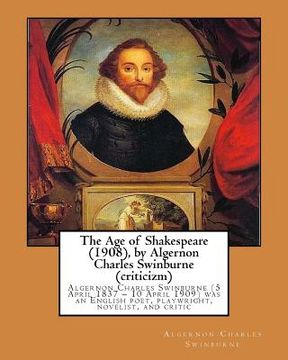The Age of Shakespeare (1908), by Algernon Charles Swinburne (criticizm): Algernon Charles Swinburne (5 April 1837 - 10 April 1909) was an English poe (in English)
Synopsis "The Age of Shakespeare (1908), by Algernon Charles Swinburne (criticizm): Algernon Charles Swinburne (5 April 1837 - 10 April 1909) was an English poe (in English)"
Algernon Charles Swinburne is often thought to be one of the most talented poets in English history. Recognized at the age of thirty as England's premier poet during the Victorian era, in a very real sense he succeeded Lord Tennyson. He published several books of poetry, many of which were considered somewhat controversial at the time, as well as a few notable essays including The Age of Shakespeare. In this piece, Swinburne shines as a poet writing about other poets, such as Christopher Marlowe, George Chapman, and John Marston, all of whom lived during the same time as William Shakespeare. He endeavors to identify what sets them apart from other writers and show how the brilliance of their works borders on the prominence of Shakespeare. He demonstrates that there were more great minds at work during this period than are often recognized. With its flowing language and insightful opinions, The Age of Shakespeare is a stimulating and profound look into a century of poetic knowledge. Algernon Charles Swinburne (5 April 1837 - 10 April 1909) was an English poet, playwright, novelist, and critic. He wrote several novels and collections of poetry such as Poems and Ballads, and contributed to the famous Eleventh Edition of the Encyclop dia Britannica. A controversial figure at the time, Swinburne was a sado-masochist and alcoholic and was obsessed with the Middle Ages and lesbianism.Swinburne wrote about many taboo topics, such as lesbianism, cannibalism, sado-masochism, and anti-theism. His poems have many common motifs, such as the Ocean, Time, and Death. Several historical people are featured in his poems, such as Sappho ("Sapphics"), Anactoria ("Anactoria"), Jesus ("Hymn to Proserpine": Galilaee, La. "Galilean") and Catullus ("To Catullus").Swinburne was born at 7 Chester Street, Grosvenor Place, London, on 5 April 1837. He was the eldest of six children born to Captain (later Admiral) Charles Henry Swinburne (1797-1877) and Lady Jane Henrietta, daughter of the 3rd Earl of Ashburnham. He grew up at East Dene in Bonchurch on the Isle of Wight. He grew up in a wealthy Northumbrian family. As a child, Swinburne was "nervous" and "frail," but "was also fired with nervous energy and fearlessness to the point of being reckless." He attended Eton College (1849-53), where he first started writing poetry. At Eton, he won first prizes in French and Italian. He then attended Balliol College, Oxford (1856-60) with a brief hiatus when he was rusticated[5] from the university in 1859 for having publicly supported the attempted assassination of Napoleon III by Felice Orsini.He returned in May 1860, though he never received a degree.He spent summer holidays at Capheaton Hall in Northumberland, the house of his grandfather, Sir John Swinburne, 6th Baronet (1762-1860), who had a famous library and was President of the Literary and Philosophical Society in Newcastle upon Tyne. Swinburne considered Northumberland to be his native county, an emotion reflected in poems like the intensely patriotic 'Northumberland', 'Grace Darling' and others. He enjoyed riding his pony across the moors (he was a daring horseman) 'through honeyed leagues of the northland border', as he called the Scottish border in his Recollections.

